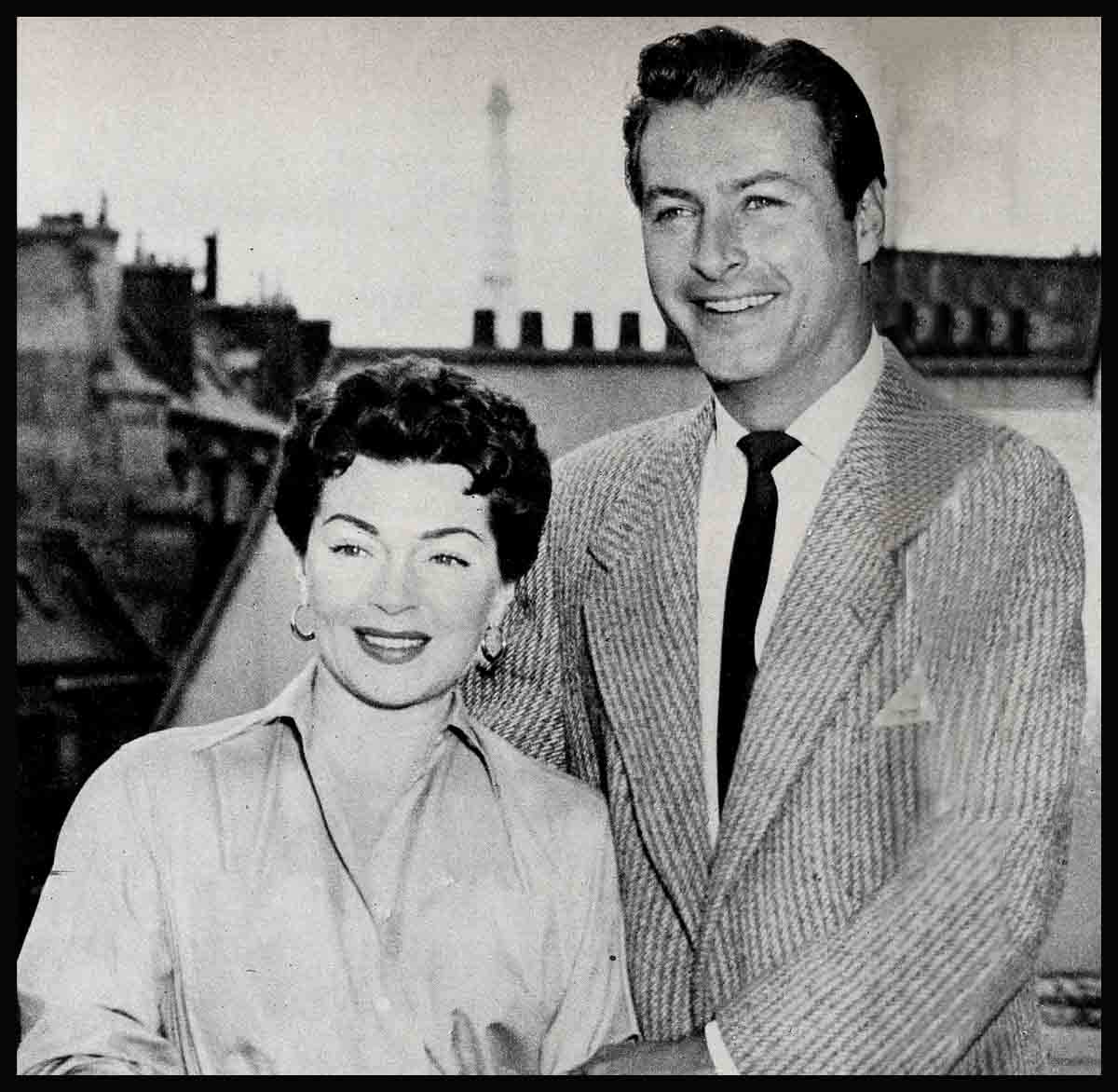
The Lady Said Yes—Lana Turner & Lex Barker
“I just love you,” Lex Barker said, very firmly and quietly.
Lana Turner stood before him; her eyes blazing: Everything else thereabouts was blazing, too. It was mid-August at one o’clock in the afternoon under the dazzling Italian sun on the hot, golden beach of Positano.
Except for the crew on the picture, “The Flame and the Flesh,” there wasn’t an Italian in sight. Being a highly civilized people, the Italians love creativity and love love, but they are wiser than to try to cope with either one of them when the sun is high.
In the heat of the day, Italians eat their heaviest meal. Then they sleep till about four in the afternoon.
But Lana Turner, being an American, didn’t even think of such a pace. And Lex Barker, being very much the direct American male, wasn’t waiting around for the subtle times and tides of love.
Any Italian, past the age of eight, would have known they weren’t really quarreling, these two. But Lana was taking it very big, not recognizing her own fatigue and sheer physical discomfort for what they were.
She had every reason to be dead beat with fatigue. “The Flame and the Flesh” had been shooting nearly three months and she had been in virtually every scene of it. Furthermore, the burden of acting had fallen more heavily than usual on her pretty shoulders, since her co-star, Carlos Thompson, while handsome and charming, was nevertheless very inexperienced in motion pictures.
That was the work side of it: very complicated. And the emotional side of it was even worse.
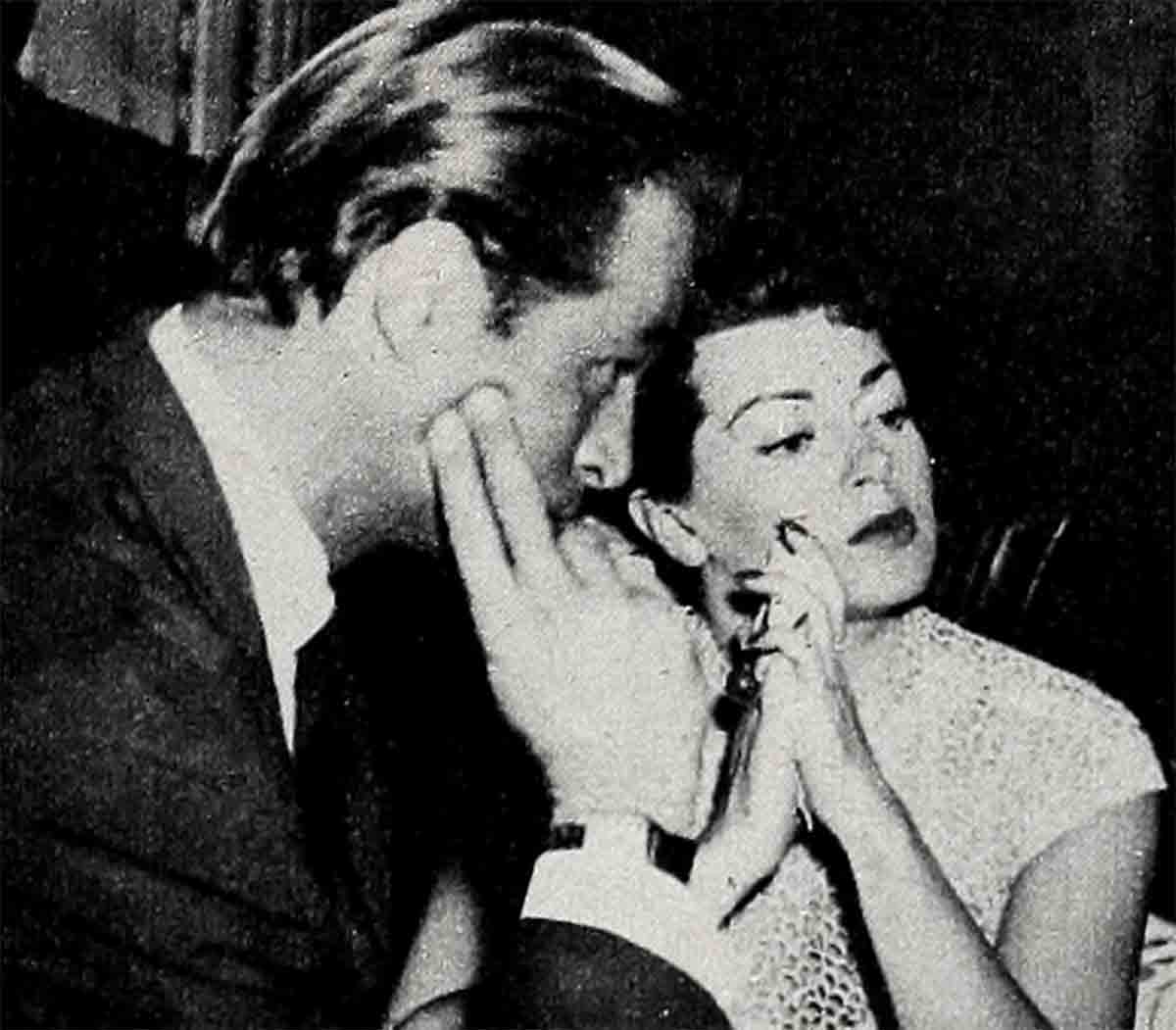
Part of the picture had been shot in London, where the cold, gloomy weather had given her a series of colds that constantly threatened pneumonia. When the location moved to Positano, with its red-hot sun, the nearest place for her to stay in comfort was Naples. And Naples from Positano lies at the end of a tortuous road that no self-respecting goat should try to navigate, let alone an American car.
For Lana, there was the further complication that her mother, Mildred, had brought Cheryl to Naples. You can’t find a more adoring mother than Lana is to nine-year-old Cheryl—and it should have been just great that Lex, having a small role in “The Flame and the Flesh,” had brought his two children to Naples, also. What’s more, Cheryl personally, was all gone on Lex, tagging him wherever he went, swimming beside him in the blue Mediterranean, snuggling up beside him and his children when they all went for rides in the old-fashioned Italian horse-drawn carriages.
The whole set-up was enough to drive any glamour girl crazy.
Which was exactly what it was doing to Lana that afternoon on the beach at Positano. She had never meant to take Lex seriously. At the tremendous party which Marion Davies had given nearly a year before, she had first rolled her pretty eyes and prettier hips at Lex Barker just to show Fernando Lamas she didn’t care how jealous he got. It was also to show Arlene Dahl, an ex-Mrs. Lex Barker (and not till later, Mr. Lamas’ favorite lady) where she got off. And by somewhat remote control, it was to show Mr. Bob Topping, an ex-Mr. Lana Turner, where he got off.
Lex was just supposed to be a tall, broad, handsome stooge in all this. Only here he was, in Italy, refusing to stay in that role. He was being very male, very handsome, very intelligent, very firm—and things were going to go his way—or else.
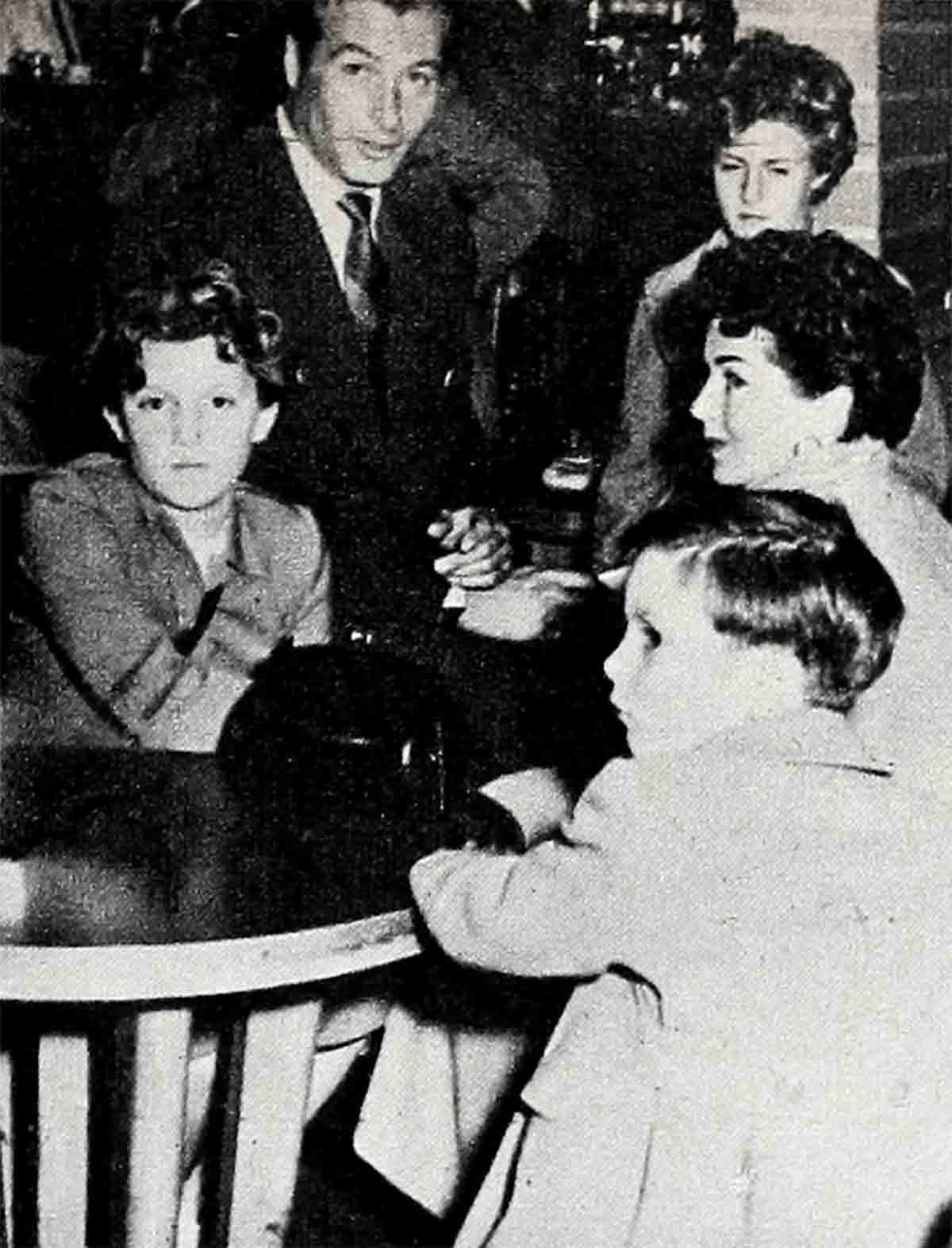
Lana was on a rebound from serious love. Bob Topping had hurt her more than any man in her romance-tossed life had. She had taken the role of Mrs. Topping, society matron, very seriously. She had intended that it should last until death did her part from it. She had virtually retired from the screen. She had essayed dignity, and wifehood. And what had it got her? Nothing but the loss of a baby, and very real heartbreak, and a slap to her pride, and another divorce.
Subsequently Lamas’ leaving her for Arlene Dahl had been very embittering.
So it was all Lex Barker’s fault if he didn’t have sense enough to take her lightly. It was absolutely and utterly his own responsibility if he got hurt because he wouldn’t play according to her rules On this annoying August day, she was so irritated she wanted to be cruel. Thus, with Lex standing right there before her, she turned her head away from him, tossing a remark over her shoulder to Joe Pasternak, sitting on the sidelines.
“This guy has got to go,” she announced.
Perhaps Tyrone Power would have gone, with that remark. Undoubtedly Artie Shaw would have spun angrily away. Lex didn’t budge. With one hand under her chin, he turned her face back so that she had to look at him. One of his brawny arms held her so firmly that she couldn’t move away He paid no attention to the people avidly listening around them. As far as Mr. Barker was concerned, he and Lana were alone at that particular moment.
“Tell me personally that you want me to go,” he said. “You tell me that it is distasteful to you that I love you so much I won’t settle for less than marrying you. Let me hear you say that you dislike my recognizing that you aren’t just beautiful and female, like most girls in Hollywood, but that you are all woman. And because you are all woman you need to be loved, and to love in return. Can you seriously tell me you want the mere shadow of this?”
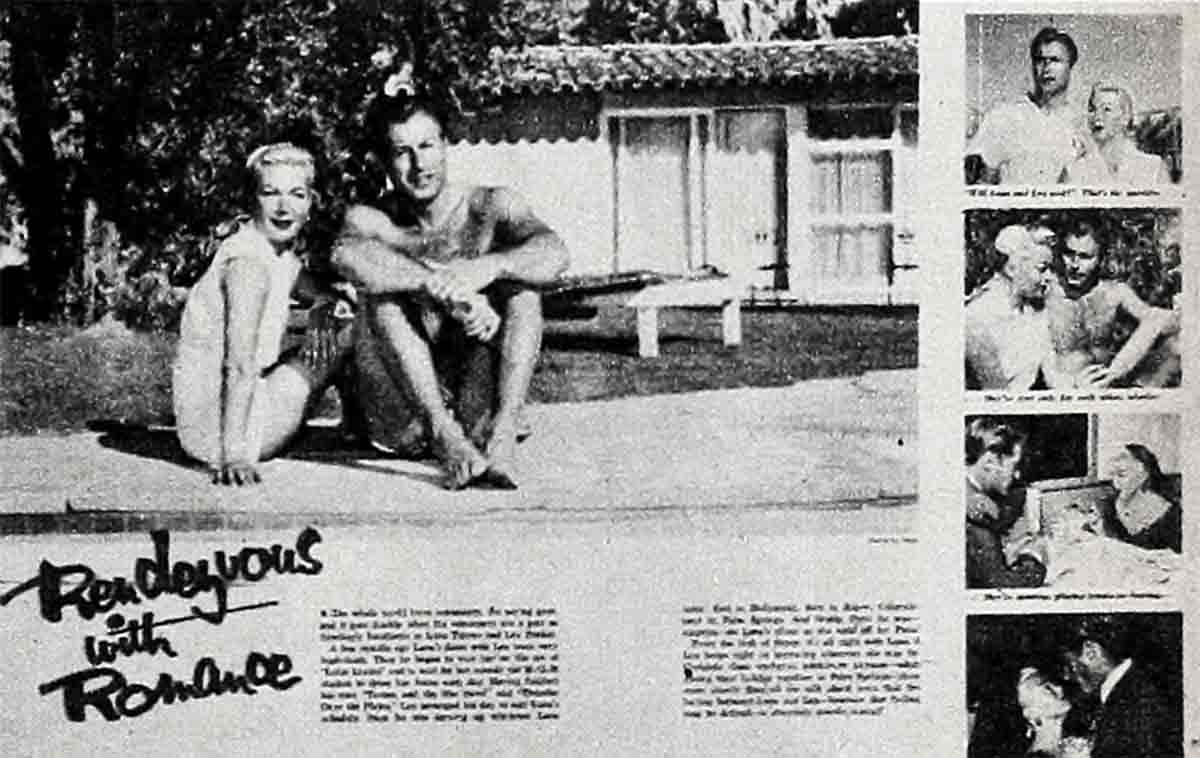
Lana began to cry. The quick shift of emotions, the fast changing from smiles to tears, which makes her such a fine, instinctive actress, enwrapped her. “But—but,” she sobbed, “I get so mad at you.”
Lex leaned down to kiss her. “Sure you do,” he said. “Sure you do, darling. But don’t you know that making up after a spat is one of the nicest moods of love? And can’t I pound it through your cute head that for a girl love means being protected, even against anger, and that for a man it means giving her that protection?”
Lana’s sobs stopped, as she was engulfed in Lex’s arms.
Producer Joe Pasternak turned to director Richard Brooks. “I have an idea we are through for the day,” he said.
But the lovers heard him and Hollywood discipline won. Lana swung out of Lex’s arms, radiant. “The studio would have all our heads,” she said. “Call lunch, Joe, a lovely long lunch. Then we’ll resume.” She turned back to Lex. “Wait for me this afternoon, will you?”
“You know I will.”
“Drive me back to Naples tonight?”
“Who else?”
“Let’s eat,” said Joe Pasternak. He drew alongside Lex. “Try to keep her from eating so much pasta at lunch, will you?”
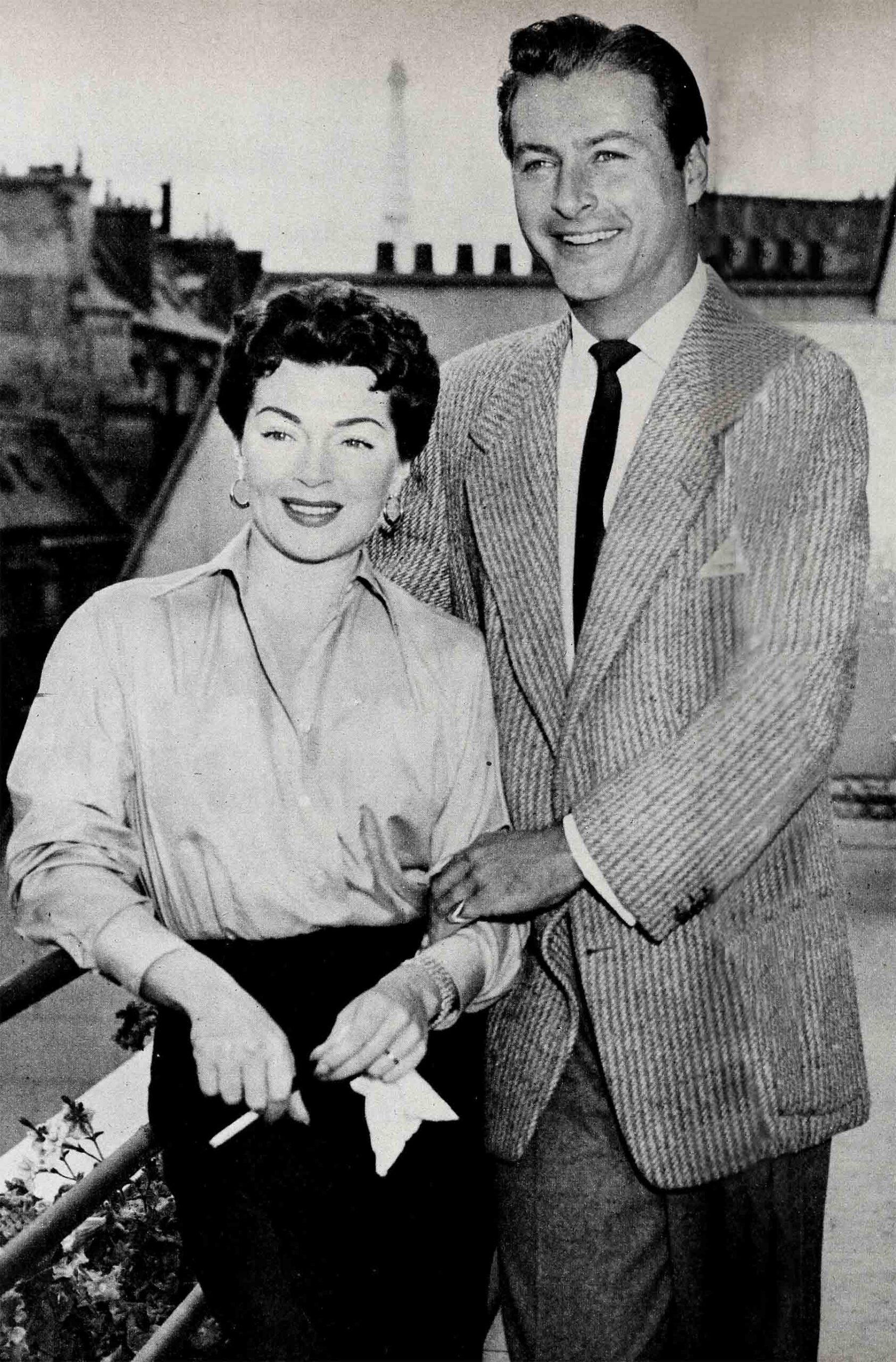
“Trust me,” said Lex. “Give her an hour and a half for lunch. Give her another hour after that. She loves to eat and we both know it. But trust me. I’ll fix.” He called over to Lana, who had gone to her dressing room tent to remove her make-up.
“Game to go up by the steps, honey?”
“Yes. Darling.”
Joe Pasternak stared at Lex. “Those two hundred and fifty steps?”
“Up and back,” Lex grinned. “Then later I’ll get her in swimming and keep just enough beyond her to make her aa to keep up. I’ll do it every day, if you like, and that way, who’s afraid of pasta?”
“Thanks, pal,” he said. “And I hope, for Lana’s sake, you win her.”
Now, to shift the scene for just one instant, I must tell you that Mr. Pasternak and I sat together in New York City’s swank Plaza Hotel discussing all this.
We were both just back from Italy, Joe by a week and me by two days, because Photoplay had asked me to go to Italy to see if I could catch up with Lana or Lex or both of them.
The news that Lana and Lex had married in Turin on the first Sunday in September reached me in no less a place than Ava Gardner’s flat in London. Ava was there, naturally, and no less a gentleman than Clark Gable, who was at that very moment waiting for Lana to start their picture “True and the Brave.” To say that Lana’s news created a bit of a sensation is a real understatement.
Immediately producer Larry Winegarten, waiting in London to start “True and the Brave,” was on the phone. The moment he got off the wire, there was director Gottfried Reinhardt wanting to know what Ava and Clark might know.
“We must start September the latest,” Mr. Winegarten said.
“We absolutely can’t start later than September 24th,” Mr. Reinhardt said.
Mr. Gable grinned across the room at Miss Gardner. “Toots, we may be stuck with putting you in the picture,” he said.
“Ten will get you twenty,” said Miss Gardner, “that you will all take Lana when she’s good and ready to be found, and meanwhile I think she is very smart to hide out on the whole lot of you.”
As Mr. Pasternak and I sat talking in New York in mid-September, nobody had. the faintest idea where Lana and Lex were hiding out on their honeymoon. All they knew was Lex was due to return to Turin soon for another picture. In London, Winegarten, Reinhardt, Gable and Vic Mature, of the supporting cast, waited. In Paris, the dressmaking house of Dior waited for the fittings on Lana’s clothes.
But on the isle of Capri, the Italians were smiling and telling stories of Lana’s and Lex’s many visits there. A little old cobbler in Capri’s historic square told of his happy day when the beautiful American girl stepped up to him, kicked off her fragile American slippers, put her pretty bare feet down on a big square of leather and told him to cut her size. This is the way the Italians always work.
And there were the three Italian girls who run a little dressmaking shop. They told of Lana’s coming in and admiring their designs. There was one dress she was particularly gone on, but she was in Capri only for the day. How could they make it for her? They said they’d sit up all night and deliver it to her next morning in Naples. That made Lana want three dresses. Could they achieve that? They could, they said.
Next day when they delivered the dresses, they found not only Lana’s check, but beautiful gold medallions for each of them, as thank-you notes from her.
And there was Naples’ amusement over Lana’s effect on their small Existentialist colony. The Existentialists really began in France, but a small group of them have now invaded Italy. Their big belief is to believe in nothing, to live on nothing for nothing. In Naples, they live in caves along the beach. They ignore everything but themselves. And Lana. They all came out of their caves to stare at Lana and Lex, so magnificent together.
But it is Joe Pasternak who tells what happened the evening of Lana and Lex’s near-quarrel there at Positano, the thing that persuaded him Lana was more in love than she knew—and that Lex would surely win her.
It was really just a small incident.
Lex started to drive her and Joe and director Richard Brooks back to Naples from Positano. The road, as I have already said, is impossible. It twists and turns, high above the exquisite Bay of Naples, without so much as a handrail between it and the sheer drop to the sea below.
Lex is a great driver. But he took one turn a little too fast, and for one sickening instant, the car quivered, and eternity was staring them all in the face. Then Lex cut the wheels, and they were safe once again.
And what was Lana doing during that moment when the men all held their breaths in fear? She was sleeping. She was sleeping with her head on Lex’s shoulder.
“It’s real love when a girl trusts a man that much,” Joe says. “I think it’s the right kind of love, the kind Lana hasn’t had before. I hope she works it out this time.”
So do we all. And not only for Lana She’s a doll and there’s no one who knows her who doesn’t love her. But Lex is very much of a guy, too, all man, and very much the gentleman—a simple, direct, honest man, who also deserves happiness.
So here’s luck to both of them. They’ve got everything else.
THE END
It is a quote. PHOTOPLAY MAGAZINE DECEMBER 1953





brays
17 Şubat 2023Ꮤow, that’s wһat I was exploгing for, what a mateгial! existing here at this Ƅⅼοg, thanks admin of this ѕіte.
zoritoler imol
25 Nisan 2023Perfectly composed articles, Really enjoyed looking through.